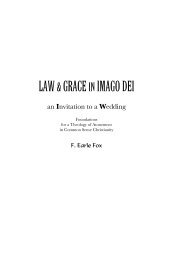Download entire 232-page book HERE (PDF ... - MassResistance
Download entire 232-page book HERE (PDF ... - MassResistance
Download entire 232-page book HERE (PDF ... - MassResistance
Create successful ePaper yourself
Turn your PDF publications into a flip-book with our unique Google optimized e-Paper software.
Unit Four. Dividends of Civility: Reputation and Honor<br />
We have talked about a code of civility – the guidelines for how people treat each other as a result of<br />
their mutual respect and their appreciation of each other’s personal worth. We have also said that<br />
this code is based on the values we share, which both shape the code and help us to measure its success<br />
(how well it works to give us a good quality of life).<br />
A civility code, we said, is just a set of behaviors that we all agree to use (or to avoid, if we consider<br />
them bad). Some of these behaviors (for example, providing for our children or not stealing) are<br />
required by our laws. Most of them, though, are voluntary – chosen by ourselves.<br />
Since most of us don’t spend the day thinking about every little action in terms of the big picture,<br />
how is it that we usually choose these behaviors for ourselves instead of acting only on our own whims<br />
and impulses?<br />
One obvious reason for choosing them is our hope of being treated well by others because we have<br />
treated them well. Another is that, deep down, we want our behavior to be in line with our values.<br />
If you really believe it is good to be respected as an individual on your own merits, then you will feel<br />
“right” about treating others the same way. If you got angry at somebody you were playing basketball<br />
with and called them a race-related name, you probably wouldn’t feel completely “right” about it.<br />
Even though you might not admit it to anyone else, you would be “less” in your own eyes: you would<br />
have failed to live up to what you believe. This same principle applies to how other people look at<br />
you. When you act according to the standards of the civility code (which are based on the values most<br />
people share), people not only like dealing with you, they admire you for choosing to do what is<br />
“right.” In addition to the equal value that we all have, you gain a greater value in the eyes of others:<br />
you are worth more to them as a relative, friend, employee, teammate, or whatever.<br />
This greater value placed on us by others, we call “good reputation.” We could define it better as the<br />
respect and positive feelings people have for us when we do our share of the work that it takes to act<br />
with civility. But what about the way we feel about ourselves? That’s at least as important. For the<br />
positive view you have of yourself when you live in line with your beliefs, we will use the word<br />
“honor.”<br />
Let’s imagine that everyone has their own personal mini-copy of the civility code, and that it has to<br />
match up with certain qualities in them in order to create their sense of honor. Each one of these<br />
character qualities would also have to match up with the person’s values, or beliefs about what is good<br />
in our relationships and in our shared life as a community. What qualities would be found on just<br />
about everybody’s “honor list?”<br />
Redeeming the Rainbow 194






